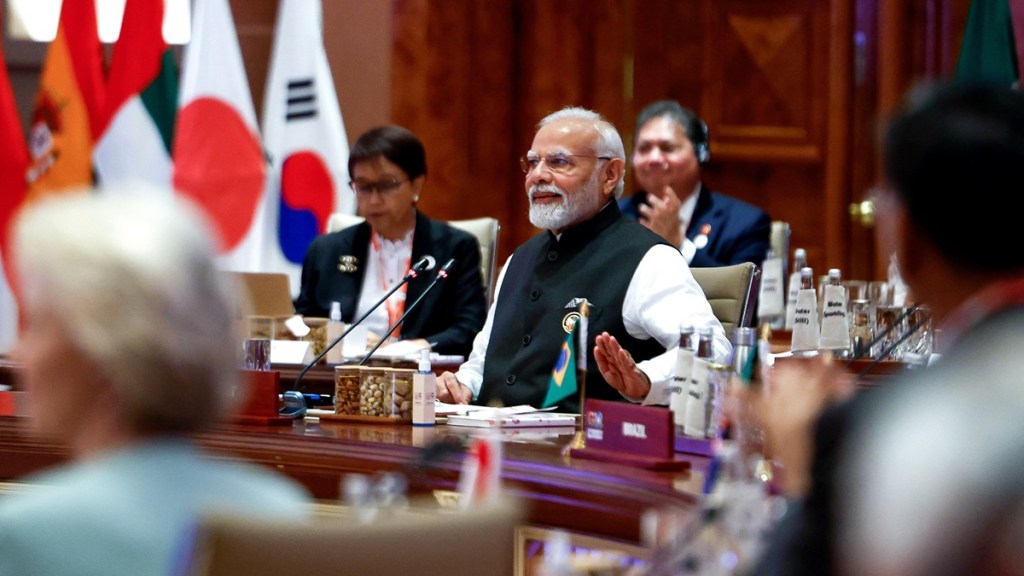The G20 Summit, a forum of the world’s major economies, convened in New Delhi, marking a pivotal moment in global diplomacy. At the heart of this summit was the New Delhi Declaration, a document that garnered significant attention and scrutiny due to its approach—or lack thereof—to addressing the ongoing conflict in Ukraine, particularly the role of Russia. The declaration’s nuanced language and careful diplomacy underscored the complex web of international relations and the delicate balance required to foster consensus among nations with diverse interests and perspectives.
The New Delhi Declaration’s adoption was a significant achievement for India, which held the G20 presidency during this critical juncture. India, as the world’s fastest-growing economy, faced the daunting task of forging a consensus among the G20 countries on two of the most divisive issues of our time—the war between Russia and Ukraine and the resulting food and energy insecurity. Given the geopolitical tensions surrounding these issues, many had anticipated that the Indian Presidency might not succeed in reaching a joint statement or communiqué.
However, on September 9, just over halfway into the first day of the two-day Summit, Prime Minister Narendra Modi made a historic announcement—the adoption of the New Delhi Leaders’ Declaration. G20 Sherpa Amitabh Kant swiftly took to social media, formerly known as Twitter, to declare that the declaration had been reached with 100 percent consensus on all developmental and geopolitical issues.
New Delhi Versus Bali
This achievement did not come without critical adjustments to the language compared to the previous Bali Declaration. The most notable difference was the absence of direct reference to Russia’s invasion of Ukraine in the New Delhi Declaration. Instead, the declaration adopted a more general perspective, acknowledging the “immense human suffering and the adverse impact of wars and conflicts around the world.” While it called for all states to refrain from the threat or use of force to seek territorial acquisition and deemed the use or threat of nuclear weapons inadmissible, it stopped short of explicitly condemning Russia’s actions. This omission raised questions about the declaration’s strength and effectiveness in addressing the conflict.
In contrast, the Bali Declaration, issued at a previous G20 summit, had taken a much firmer stance, stating that “most members strongly condemned the war in Ukraine” and highlighting its severe consequences on the global economy. The Bali Declaration had painted a bleak picture, emphasizing how the conflict had constrained economic growth, increased inflation, disrupted supply chains, heightened energy and food insecurity, and elevated financial stability risks.
The New Delhi Declaration also differed in its treatment of the term “sanctions,” which featured prominently in the Bali Declaration but was noticeably absent in its New Delhi counterpart. Both declarations acknowledged that the G20 was not the appropriate forum to resolve security issues. However, the omission of “sanctions” represented a shift from the Chair’s Summary and Outcome Document issued after the Gandhinagar meeting of finance ministers and central bank governors.
Russia had consistently argued that the G20’s language was one-sided and had urged the consideration of the impact of economic sanctions imposed on it by Western countries on the global economy. The exclusion of “sanctions” from the New Delhi Declaration signaled a departure from this contentious issue.
External Affairs Minister S. Jaishankar concisely summed up India’s perspective on the language disparities between the Bali and New Delhi declarations, saying, “Bali was Bali, New Delhi is Delhi. Many things have happened since the Bali Declaration.” This viewpoint emphasized the evolving nature of international affairs and the need for diplomatic adaptability to address changing circumstances.
The New Delhi Declaration’s adoption carried significant implications on multiple fronts. It was undoubtedly a triumph for India’s G20 presidency, particularly given the geopolitical complexities surrounding the Russia-Ukraine conflict. India managed to secure unanimous backing from the G20 member countries for a joint statement—a feat that had appeared nearly impossible.
Moreover, the declaration could be seen as a diplomatic victory for Russia. Despite sharp criticism from the G7 nations in the days leading up to the summit, explicit mention of Russia’s aggression was avoided in the final declaration. This outcome left Russian Foreign Minister Sergei Lavrov content as he left the Indian capital.
However, the implications extended beyond the diplomatic sphere. The New Delhi Declaration carried the potential for positive economic impacts, primarily through the possible revival of the Black Sea Grain Initiative. This initiative, initially brokered by the United Nations and Turkiye in July 2022, aimed to ensure the safe transportation of grain and foodstuff from Ukrainian ports. Russia’s disruption of this agreement by bombing Ukrainian ports in July 2022 had triggered a global food crisis, leading to higher food prices.
If the G20 succeeds in reviving the Black Sea Grain Initiative swiftly, it could benefit both developed and developing nations. These nations have borne the burden of increased food prices caused by disruptions in grain supply from Russia and Ukraine. The revival of this initiative could alleviate food shortages and reduce price volatility in international markets.
However, amidst these diplomatic and economic considerations, according to reports in the public domain one party remains deeply aggrieved — Ukraine. A spokesperson for the Ukrainian foreign ministry expressed disappointment with the G20’s stance, stating that the organization had “nothing to be proud of.” For Ukraine, the absence of explicit condemnation of Russia’s actions in the New Delhi Declaration represented a missed opportunity for international support.

